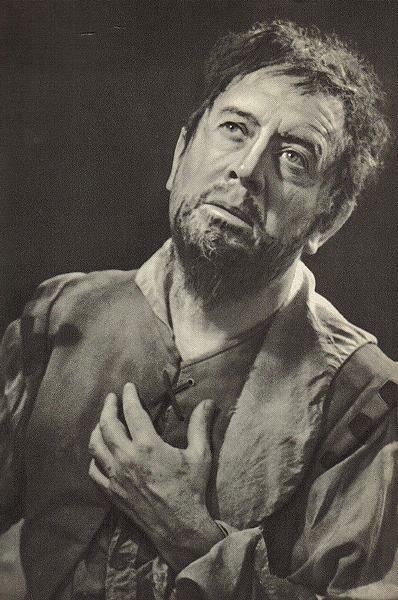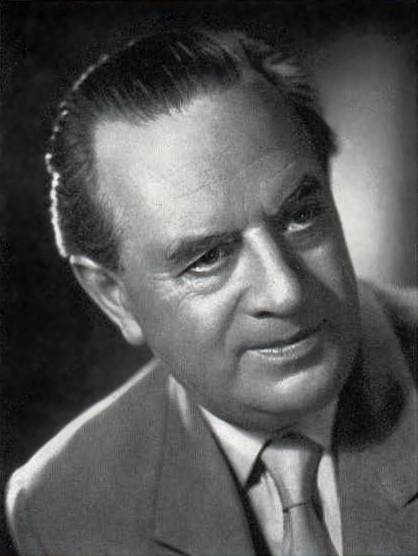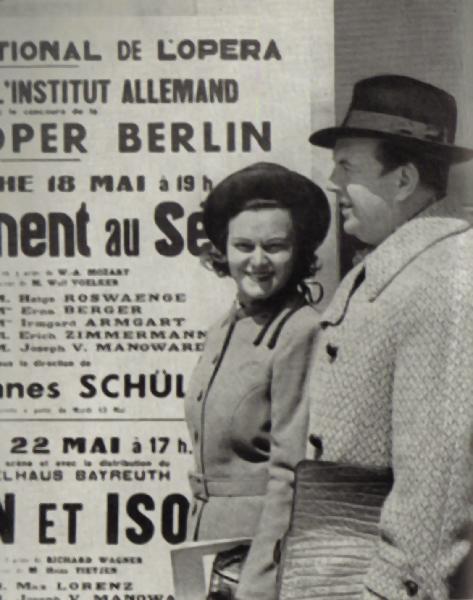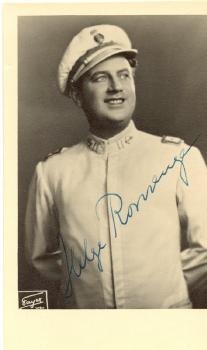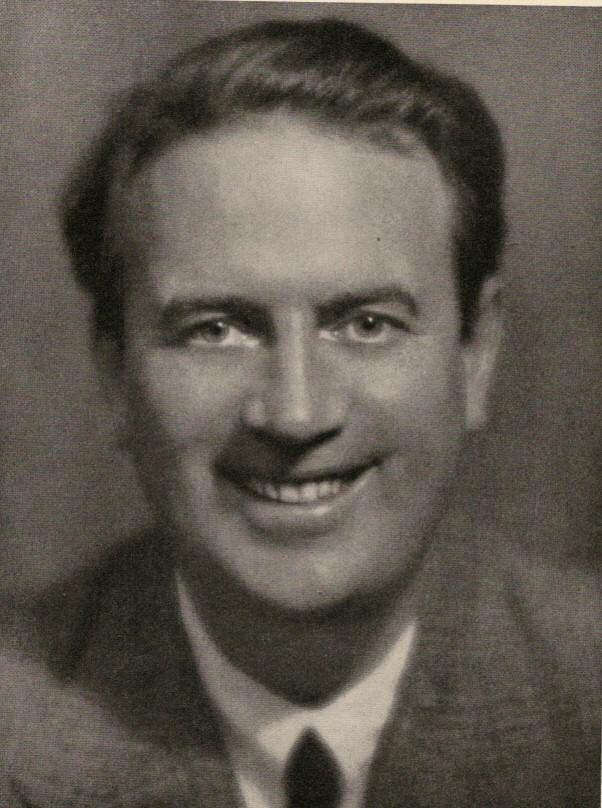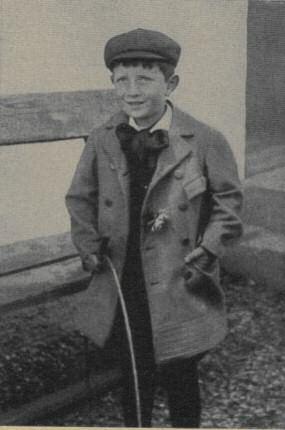Helge Rosvaenge
29 August 1897 Copenhagen – 19 June 1972 Munich
Fidelio
with Erna Berger
6 years old
| Helge Rosvaenge sings | Il trovatore: Di quella pira, film version set in a restaurant |
In RA format
Grammophon, 1935
In RA format
Electrola
In RA format
In RA format
In RA format
In RA format
In RA format
In RA format
On Rosvaenge, cf. also Opera for the German Reichsrundfunk, by Daniele Godor
Repertory
Rosvaenge, born Helge Rosenvinge Hansen, graduated in chemistry from the Technical University in Copenhagen. His voice was
discovered by chance when he sang for friends in Schwerin; one of them was the Hungarian soprano Ilona Holndonner, who told him to
study voice, and instantly gave with him in Schwerin what was to become his debut concert. Holndonner was soon to become his wife.
He took voice lessons in Copenhagen and Berlin, and after a few concerts in Denmark, he made his stage debut in 1921 in Neustrelitz
as Don José.
He sang in Altenburg (1922–24), Basel (1924–26) and Köln (1926–29) before he became a member of the Berlin
Staatsoper in 1929 (until 1945) and the Vienna Staatsoper in 1932 (until 1957). Since he always sang in German-speaking countries,
he was often written Roswaenge.
Guest appearances throughout Europe: Milano, London (Covent Garden), Copenhagen, Stockholm, Amsterdam, Brussels, Antwerp, Munich,
Dresden, Hamburg, Salzburg Festival (frequently), Cairo (1933 as Radamès, a big success), Barcelona, Bucarest, Budapest, Bayreuth
(Parsifal, 1934 and 1936). He was famous not only for his top, but not least for his stamina: he sang about 200 performances per
year and was the first major singer who travelled by airplane so as get around quicker. When he sang Canio, he usually insisted on
singing also the prologue since the role of Canio alone didn't keep him busy enough for a whole evening.
He was a member of the Nazi party since 1933, and good friends with Hermann Göring. He sang concerts for Nazi organizations,
and he wanted to help create the model Nazi opera: he chose the subject, he chose the librettist, he chose the composer, he looked
after the Vienna Staatsoper world premiere, he even wrote the invitations for the VIP guests by hand, and of course he sang the
lead character: the opera in question was Königsballade by Rudolf Wille, premiered in 1939. It was a failure, and got
only three performances.
In 1945, the Soviets deported Rosvaenge to a camp near Moscow; after a few months, he could leave the country. He went to Spain, at
that point the only Fascist country in Europe, and returned to his old profession as a chemist, quite successfully: from the patents
he received in those years, he earned money for the rest of his life.
In 1948, he went back to Central Europe, and to stage: after a short stay in Switzerland, he returned to Vienna, and took up his
career at both the Vienna Staatsoper and the Volksoper (which latter was, at the time, also part of the Staatsoper, whose first
stage was the Theater an der Wien, the Staatsoper building proper having been destroyed in the war).
A few years later, Rosvaenge also returned to Berlin, but quite surprisingly: to Communist East Berlin! He sang there regularly,
and was quite popular – so popular that he rewrote his autobiography Lache, Bajazzo as Mach es besser, mein Sohn;
the new version was printed in East Germany. Comparison of those two books is as ugly as studying the Nazi period and its aftermath
can get. The first version, for all formal distancing from the Nazis, clearly exudes the resentments of Göring's friend. The
second version, on the contrary, is full of vitriolic remarks against the Nazis, and of antifascist ostentation...
Rosvaenge's career was long. He gave guest appearances in Zürich, Basel, Bern, Lucerne, Köln, at the Salzburg, Bregenz,
Bad Hersfeld and Tecklenburg festivals, even in New York (concerts at Carnegie Hall, 1963, and Madison Square Garden, 1964), but
also at the tiny provincial theater of Sankt Pölten: Carmen, Land des Lächelns and Pagliacci in 1963 and 1964. (It was
high time to retire, as ultra-rare recordings from those performances prove.) Still in 1970, he sang a secondary part at the
Gärtnerplatztheater in Munich, the city where he lived and taught voice.
Reference 1: Kutsch & Riemens; reference 2;
reference 3: Robert Schlesinger: Gott sei mit unserm Führer. Der Opernbetrieb im deutschen Faschismus, Wien 1997, pp. 102 & 118;
reference 4: Helge Rosvaenge: Lache, Bajazzo. Ernstes und Heiteres aus meinem Leben, München-Wien 1953; reference 5: Helge
Rosvaenge: Mach es besser, mein Sohn. Ein Tenor erzählt aus seinem Leben, Leipzig 1963
- Carmen (José), 1921
- Faust (Faust), 1921
- Les dragons de Villars (Sylvain), 1921
- Martha (Lyonel), 1921
- Les contes d'Hoffmann (Hoffmann), 1922
- La fille du régiment (Tonio), 1922
- La finta giardiniera (Belfiore), 1922
- Der Kuhreigen (Primus Thaller), 1922
- Die lustigen Weiber von Windsor (Fenton), 1922
- Die Meistersinger von Nürnberg (Balthasar Zorn), 1922
- Die toten Augen (Hirt), 1922
- La traviata (Alfredo), 1922
- Il barbiere di Siviglia (Almaviva), 1923
- Madama Butterfly (Linkerton), 1923
- Rigoletto (Duca), 1923
- Tristan und Isolde (Junger Seemann), 1923
- Die Weiberverschwörung (Astolf, composer Schubert), 1923
- Abu Hassan (Abu Hassan), 1924
- La dame blanche (George Brown), 1924
- Der Fremde (Hein, composer Kaun), 1924
- La Juive (Léopold), 1924
- Les pélerins de la Mecque (Ali), 1924
- Das Rheingold (Froh), 1924
- Der Rosenkavalier (Sänger), 1924
- Tiefland (Nando), 1924
- Der Wildschütz (Kronthal), 1924
- Die Zauberflöte (Tamino), 1924
- Don Gil (Don Martin, composer Futterer), 1925
- L'elisir d'amore (Nemorino), 1925
- Die Entführung aus dem Serail (Belmonte), 1925
- Der Freischütz (Max), 1925
- Její pastorkyňa (Števa), 1925
- Die Meistersinger von Nürnberg (Vogelsang), 1925
- Mignon (Wilhelm Meister), 1925
- Der Obersteiger (Roderick), 1925
- Tannhäuser (Walther), 1925
- Adrienne (Baron von Kayserling), 1926
- Fra Diavolo (Fra Diavolo), 1926
- Oberon (Oberon), 1926
- Turandot (Pang), 1926
- Così fan tutte (Ferrando), 1927
- Don Gil (Don Manuel, composer Braunfels), 1927
- Don Giovanni (Don Ottavio), 1927
- Judith (Soldat), 1927
- Pélléas et Mélisande (Pélléas), 1927
- Le postillon de Lonjumeau (Chapelou), 1927
- Tosca (Cavaradossi), 1927
- Cardillac (Cavalier), 1928
- La belle Hélène (Pâris), 1928
- Fra Diavolo (Lorenzo), 1928
- Palestrina (Abisu), 1928
- Zar und Zimmermann (Chateauneuf), 1928
- Un ballo in maschera (Riccardo), 1929
- Der Barbier von Bagdad (Nureddin), 1929
- Cavalleria rusticana (Turiddu), 1929
- Louise (Julien), 1929
- Knjaz Igor (Vladimir), 1930
- Die Zierpuppen (Grange, composer Lattuada), 1930
- Les Troyens (Aeneas), 1931
- Die ägyptische Helena (Da-Ud), 1931
- Alceste (Admeto), 1931
- La forza del destino (Don Alvaro), 1931
- Manon Lescaut (des Grieux), 1931
- Eine Nacht in Venedig (Herzog), 1931
- Oberon (Hüon), 1931
- Fedora (Loris), 1932
- Die Frau ohne Schatten (Jüngling), 1932
- Les huguenots (Raoul), 1932
- Idomeneo (Idomeneo), 1932
- Spuk im Schloss (Georg, composer Kricka), 1932
- I vespri siciliani (Arrigo), 1932
- Arabella (Mattheo), 1933
- Aida (Radamès), 1933
- Bastien und Bastienne (Bastien), 1934
- Der Bettelstudent (Simon), 1934
- Guillaume Tell (Arnold), 1934
- Parsifal (Parsifal), 1934
- Ariadne auf Naxos (Bacchus), 1935
- Die grosse Sünderin (Schrenk, CR), 1935
- Der Schauspieldirektor (Kapellmeister), 1935
- Fidelio (Florestan), 1937
- Pagliacci (Canio), 1937
- Die Königsballade (Harald, composer Wille, CR), 1939
- Don Carlo (Don Carlo), 1940
- Zhizn za tsarja (Sobinin), 1940
- Charodejka (Jurij), 1941
- Andrea Chénier (Andrea Chénier), 1942
- Turandot (Calaf), 1944
- Tausendundeine Nacht (Suleiman), 1949
- Das Land des Lächelns (Sou Chong), 1951
- La fanciulla del West (Dick Johnson), 1953
- Iwan Tarassenko (Fedja, composer Salmhofer), 1953
- Die Fledermaus (Alfred), 1954
- Rendez-vous um Mitternacht (Felix, composer Kattnigg, CR), 1956
- Der Zigeunerbaron (Barinkay), 1960
- Les brigands (Falsacappa), 1961
- Das Dreimäderlhaus (Schubert), 1965
- Orphée aux enfer (Orphée), 1966
- Der Zigeunerbaron (Carnero), 1968
- Yolimba (Italian tenor, composer Killmayer), 1970
Radio
Otello (Otello), 1943
Die Landstreicher (Adolar, composer Ziehrer), 1967
Ein Walzertraum (Minister), 1969
Rosvaenge as a baritone
Reference: Richard T. Soper: Nordic Voices, Shires Press, 2010.
I wish to thank Daniele Godor for the pictures (with Erna Berger, Fidelio, bottom 2) and recording (Otello).
I wish to thank Thomas Silverbörg for the picture (private) and recording (Chénier).
|
